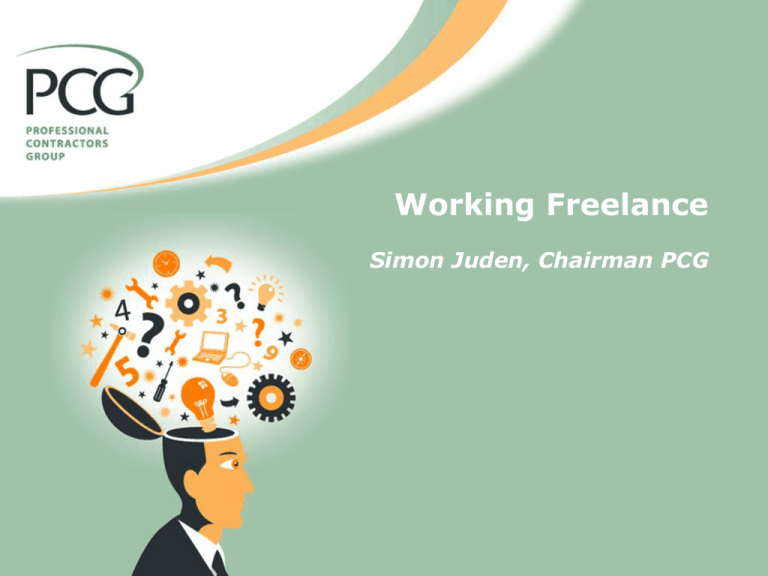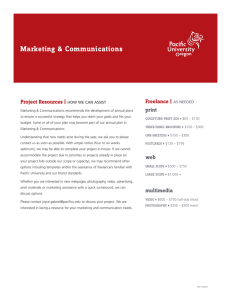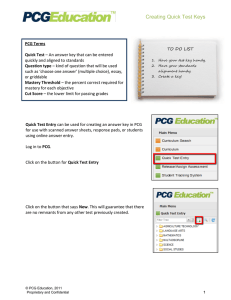Working Freelance Simon Juden, Chairman PCG
advertisement

Working Freelance Simon Juden, Chairman PCG Self employment in the UK has increased markedly in recent years, and since mid – 2002 has been growing faster than at any time since the late 1980’s. Labour Market Trends October 2004 “40% of the UK workforce will be freelance by 2010” Professor Richard Scase, University of Kent at Canterbury Agenda • Today’s freelance market • Future directions • Starting out: what you need to know • Taxation • Marketing yourself: finding work • The PCG Today’s freelance market UK Working Population August 2004(m) 218, 1% 6384, 22% 840, 3% 2774, 10% 18176, 64% Full time employees Full time self employed Part time employees Other Part time self employed Source LFS Aug 2004 Number of people self-employed (UK 1985-2003) Growth areas/sectors • • • • • • • Finance HR and change management Leading IT Construction Engineering Marketing Public sector (though procurement issues) – Health – Education – Transport Motivations: economic • Increase in house prices reduces credit constraints • Recent research suggests that 1 in every 30 adults in the UK (1.4 million) is actively trying to set up a new business at any one time. (2001) • Four in every 100 people start-up a business because of an opportunity and 1 in every hundred does so because they have no better choice for work (necessity entrepreneurs) • Respondents were positive about the climate for entrepreneurship, although fear of failure would prevent 34.1% of people from starting up a business Motivations: lifestyle • Belief that self-employment offers greater responsibility, more flexibility, more challenges and larger rewards, plus more personal freedom and a better work-life balance. • 80% of self employed are satisfied or very satisfied with work vs 64% of full time employees (Work Foundation) • Research from the Working in Britain suggests that whilst people are staying in their jobs slightly longer than in 1992, work is not challenging or rewarding our abilities (Work Foundation) Employee Space Not jobs for life Market drivers - life of jobs No loyalty Lack of challenge and reward Business Space Space for self A new generation Self esteem Work life balance Freelance Interim Self employed Consultant Self determination Increased competitiveness Focus on strategic core, new models Adaptive and flexible Outsourcing trends Low investment in human capital Employer space Focus on costs and service ICT – anytime any place Use of “freelancers” Trust is diminished Future directions Potential pitfalls • ca 4,500 More Laws and Regulations Since 1997 • Higher insurance and employer liability premiums • Procurement Policies of Large Corporations – Terms of Trade – The Internet • • • • Planning regulations - businesses at home Taxation Poor training opportunities Risk/insecurities and work/life balance – Use of Home Resources • Where do you go for regular up to date advice? Areas of concern Resources 2% Managing your finances 4% New technology 4% Cash flow 5% Taxation 20% Marketing yourself 7% Updating your skills 9% Changes in legislation 20% Economic environment 14% Source PCG annual survey 2004, base 698 Finding new business 15% Psychology of the freelancer Freelance consultants Non conformist Individual Self focused Need recognition Cynical and suspicious? Creativity, innovation, expertise Business solutions – organisational change Source: R Scase Evolution of a trust relationship BREADTH OF BUSINESS ISSUES TRUSTED ADVISOR VALUABLE RESOURCE SUBJECT + RELATED TOPICS TECHNICAL SUBJECT MATTER DEPTH OF PERSONAL RELATIONSHIP Source: R Scase What can you do to become a long term successful consultant? • • • • • • • • • • Experience counts Avoid the pitfalls Know where to get advice Be adaptive/flexible and agile Keep close to your clients and their needs Recognise and use varied channels to work Become a trusted advisor Invest in building your skills and professional status Develop trading networks and alliances Know where to go for advice and support Questions and Answers Starting out: what you need to know Issues for freelancers • Living outside “the corporate umbrella” • Running your own business • Managing finances • Finding work • Lifestyle implications • Retaining your hard-won earnings Setting up your business • Choosing the right structure – Limited company – LLP – Partnership/sole trader – Umbrella and composites – “Clever schemes”: too good to be true? • Often the drivers are commercial (e.g. in IT) Accounting, banking and insurance • Choosing an accountant • Choosing a bank • Insurances – Employers and Public Liability – Professional indemnity – Tax investigation – Permanent health Tax matters • IR35: myths and realities • Section 660a • VAT • Taxation of limited companies, LLPs, sole traders • Self assessment • Professionals will do most of this for you Getting paid • Paying yourself – Limited company – Self-employed – Managing cash flow Work location • Client work vs work for own business – Travelling expenses • Working from home – Business rates – Capital Gains Tax issues – Lifestyle issues • Rented offices Accounting records • Using a computer system • Mixing personal and business finances • Retention of records Personal finances • Savings, holidays and buffers • Retirement and pension • Funding your car Finding work • Sources of work – Agencies – Own network – Others network – Cold – Jobserve – PCG Exchange Taxation “Taxation with representation ain’t so hot either.” Gerald Barzan Some taxes to be aware of • IR35 • S660A • Non-Corporate Distribution Rate • Pre-Budget Report IR35 "I really do prefer naivety or even foolishness in politicians to hypocrisy and deception. Dawn Primarolo seemed to be very pleasant, and clearly fell within the first pair rather than the second. I was particularly amused by the way in which she sincerely believed that the Budget measures would simplify matters and lead to a fairer and more efficient tax system. While I might have thought that someone with the several years experience in the job that she had would have realised the silliness of such statements, she seemed entirely at ease with her conscience in making them." Graham Aaronson, QC, on IR35 IR35: scenarios • May apply to work through limited company • Different pieces of work can be inside/outside • Relies on the Self Employment Status tests • Involves an imaginary contract • Punitive levels of tax (more than half of 95% of turnover) IR35: factors • Three key elements: – Requirement for personal service – Control – Mutuality of Obligation • Case law clarifying boundary • Extremely complex to assess status • You may not be able to see all relevant contracts IR35: what can you do? • Educate yourself • Make sure your accountant understands freelancing • Get your contracts reviewed (leverage agency regs to help negotiate if you need to) • Use top-notch professional advisors • PAYE visits are often IR35 trawls • Be aware that the Revenue often gets it wrong IR35: the future • Repeal extremely unlikely • Work on implementation ongoing • Any re-examination of the self employment tests should help S660A – potted history • Settlements legislation • Around since 1930s • Tax Bulletin 64 (April 2003) brought new interpretation • PCG taking test case (Arctic Systems) through the courts S660A: who is at risk? • Limited company or partnership • Ownership shared with spouse (or other) • Profits shared with spouse (or other) • Revenue seek to go back six years, though it’s not clear that they can do this • Revenue will attack where there’s most to gain S660A: what can you do? • Educate yourself • Very little can be done about earlier years • Document input to business of spouse • Consult your tax advisor for advice going forward • Don’t panic S660A: the future • A huge amount depends on the Arctic Case • Implementation discussions: CIOT et al • Tax Bulletin 64 was issued April 2003: strong moral argument for not assessing before this • Apparent conflicts with: self-assessment, independent taxation of spouses, company law, divorce law... Non-Corporate Distribution Rate • “The right amount of tax” • Effectively reverses the introduction of a 0% Corporation Tax band • Least-worst option for freelancers at the time • Fundamental re-think may be on the way: this year’s Pre Budget Report will include a discussion document Questions and Answers Marketing yourself: finding work Sales and marketing - important for my business? “For many freelancers, the biggest obstacle to success is that so many look upon themselves as technical or creative people first and business people last. They like to think that a professional doesn’t need to resort to the dirty world of marketing or selling.” Roy Sheppard, leading expert on networking and referral marketing www.royspeaks.com Top tips - number 1 • Develop and demonstrate a positive attitude – Believe in yourself and acknowledge that you are good at what you do – Act successful – people prefer winners to losers – Cultivate a “can do” mentality Top tips - number 2 • Get organised – Create a proper contact management system • Every person and organisation capable of giving you business • Everyone you know who might know someone you can • Every person or organisation that you want to work with or for – Use it meticulously, every day – Create a folder for every client and potential client Top tips – number 3 • Define your offering – Clearly define your product and service offerings – Work out your pricing model – Identify your strengths and weaknesses (SWOT analysis) – Identify your main competitors – Identify what is special about your product and service offerings – Review this on an ongoing basis Top tips – number 4 • Specify your targets – Identify your target audience and market segments – Analyse existing clients by market sector to assess whether there are niche opportunities you can exploit – Create a “most wanted list” of companies that you want to do business with – research them and add them to your contacts database Top tips - number 5 • Create your brand image – Basic logo – Business cards, letterheads – Website, email address – Response materials and marketing collateral – The way you dress, conduct yourself, talk, answer the phone and write business letters Top tips - number 6 • Invest in a decent website – Proper domain name - .co.uk or .com, for example – Content-rich and dynamic – Easy to navigate, quick to load – Optimised for a good search engine ranking – List in one or more of the major directories – Don’t forget a response mechanism and email opt-in Top tips - number 7 • Use email for cost-effective direct marketing – Mail only those people who have agreed to receive email from you – Please do NOT send unsolicited email – Send newsletters and white papers with interesting articles – Offer advice, tips and offers – Make sure that you have an unsubscribe option Top tips - number 8 • Learn to network – Develop and practice delivering a focused 60-second pitch – Spend time developing your networking skills – Join a local business networking group, such as BNI – Go to PCG “Real Life Meetings” – Build up a list of associates offering complementary goods and services Top tips - number 9 • Grow your business by nurturing your pipeline – Hot • Existing and previous customers • Previous contacts – Warm • Referrals from good contacts – Luke warm • Networking activities • Web sites often list key officials (this is a good source) • Look out for press releases and company news in the press – Cold • Your “most wanted list” • Contacts harvested at shows and events Top tips - number 9 ALL CONTACTS Areas of relevance Communication General enquiry Specific contact Face to face meeting Invitation to tender Proposals Contracts Top tips - number 10 • Manage your client relationships - Invest time in building the relationship - Understand each other’s expectations and needs - Work to build trust and become a “trusted adviser” - Listen and communicate - Agree the guiding principles Convey commitment and ability Operate to the principles you have agreed Never forget to communicate - Take care of the little things - Ask for feedback and – if need be - rescue early Top tips - number 11 • Manage your agency - Be flexible with regard tailoring your CV - Keep in contact and remember the various relationships - Do not break your contract - bad news does travel - Befriend your agent - he or she is doing a job - Be aware that agents often get paid on results - Be open about other things you have on the go - Have written references with your CV - Dress and talk for the job you want, and have a strong handshake - Be professional and credible, and do not smoke before an interview Top tips – number 12 • Indulge in some public relations (PR) – Look for press opportunities in relevant trade journals – Write white papers and technical articles – Write sales stories – Issue short press releases on recent successes – Make yourself available for interviews Top tips – number 13 • Don’t be afraid to ask for help – Outsource the things you really cannot handle – PCG has various resources: • Forums • Real life meetings • Fellow freelancers who offer website design, stationery printing and various other goods and services – Develop your network of freelancers – Find a mentor “buddy” to support you Top tips – number 14 • Enjoy what you are doing – Belief and passion are contagious – If you are enthusiastic about what you do, your clients will share that with you – It’s not just about making money – the real bonus comes from enjoying what you do and knowing that you can add value to your clients’ businesses Conclusion • And finally…….. – Remember that having a positive attitude and believing in yourself are key to your success – Planning, organisation and persistence will pay dividends – People buy from people – Having a proper marketing strategy and expenditure is a pointer for being in business on your own account Getting help • Sources of advice: – Other freelancers – PCG members – PCG forum – PCG office – Accountant ‘You have brains in your head. You have feet in your shoes You can steer yourself any direction you choose You’re on your own And you know what you know And YOU are the guy Who’ll decide where to go.’ ‘Oh the Places You’ll Go!’ Dr Seuss Questions and Answers The PCG PCG – the vision • The voice of freelancers – working with Government and industry to protect and promote freelancing and freelancers, on a local, national and European level • The heart of the freelance community – supporting and nurturing its members through all parts of the freelance life cycle, as well as offering commercial support, fostering peer support and encouraging new ways of working History of PCG • Formed in March 1999 • Initial aim to lobby against the Government’s IR35 proposals • In May 2000 members voted to become the representative body that PCG is today • 12,000+ members • Run by freelancers for freelancers PCG objectives • Protect the business interests of its members • Liaise with Government, NGOs and relevant EU bodies • Promote the value of freelancers • Encourage development of the freelance community • Help members to develop themselves and their businesses • Offer lifestyle support and guidance Recent achievements • Continued to support members’ cases – current status 500+ cases won, versus 2 lost • Appointed Government representatives at ILO • Successfully lobbied for the opt-out clause for incorporated freelancers in DTI’s new Agency Regulations • All IT skills removed from Skills Shortage List • Achieved ISO9001 Current activity: some highlights • Arctic Systems • PCGQS – an ISO9001 for freelancers • Lobbying • Range of publications • Approved contracts/terms and conditions • Regional work Benefits of membership • Professional Expenses Insurance • Support and help drive focus for lobbying • Sample contracts drafted by experts • Access to free tax and legal helplines • IR35 and S660A analysis and manuals • Discounted hotels, insurance, travel and software • Entry to the freelancers’ online community Value of PCG membership Standard contract templates, £300.00 Regus Gold Membership, £50.00 IR35 analysis and manuals, £100.00 Total value £975 Professional Expenses Insurance , £288.00 Acces to free tax and legal help lines, £238.00 Questions and Answers Questions and Answers




